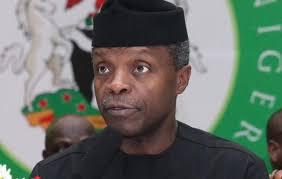The Vice President, Prof. Yemi Osinbajo, has put Nigeria’s funding need to modernize energy infrastructure across the country at about $1 trillion.
He gave this projection in his keynote remarks while declaring open the National Energy and Climate Change summit on Thursday in Abuja, saying that government is doing its best to attract domestic and foreign-direct investments into the capital-intensive energy sector.
Osinbajo explained that the nation’s energy and energy-related policies were not only geared towards energy supply security but to also mitigate global warming.
The Vice President, who was represented at the forum by Minister of Science and Technology, Dr. Ogbonnaya Onu, told the audience that the Federal Government had entrenched transparency and openness in governance to support private investments across the broad spectrum of the nation’s economy.
He explained: “This important event will provide a high-level forum to discuss energy and climate change as they relate to economic development and environmental protection. I am happy that this summit is taking place at a time the Federal Ministry of Science and Technology, FMST, is working hard to help move our economy away from being resource-based to an economy that is knowledge-based and innovation-driven.
“I am hopeful that at the end of your deliberations, you will be able to provide solutions towards improving sustainable energy supply and access in the country.
‘’I am happy that the International Energy Charter, IECh, a reputable inter-governmental energy organisation that has the main objective of promoting multi-lateral framework for cross-border cooperation in the field of energy development is here with us”, Osinbajo added.
The Director-General of Energy Commission of Nigeria (ECN), Prof. Eli Bala, in his remarks at the event said that in line with its mandate, the commission instituted the summit to serve as a forum where national issues on energy in all their ramifications were discussed for the purposes of facilitating effective monitoring and assessment of performance of the energy sector.
Similarly, the European Union Head of Cooperation to Nigeria and ECOWAS, Kurt Cornelis, disclosed that the EU had so far committed €150 million to support Nigeria through several projects cutting across the nation’s electricity value chain.
He said: “Just to mention a few, the EU from this envelope, is co-financing phase 2 of NESP with 20 million euros as well as a support to TCN with 25 miliion euros grant to construct the Kura-Jogana-Gwiwa-Daura-Katsina double circuit 330KVA transmission line and substations which will also help evacuate the 1000MW Jigawa solar city project.”
According to him, the focus of the EU is to increase support to Nigeria’s Climate Change initiatives by collaborating with the Federal Ministry of Environment on a new change action scheduled to kick off next year and continue to create awareness at the highest stakeholders’ levels on the need take concrete measures to address climate change challenges in the country.
He commended the Federal Government for having the political will to promote the use of renewable energy technology in the nation’s energy mix, assuring the EU and ECOWAS continued support for to the country in its energy access drives.






